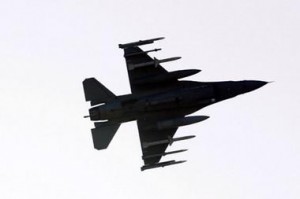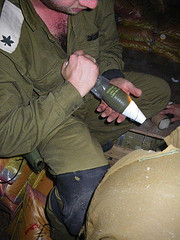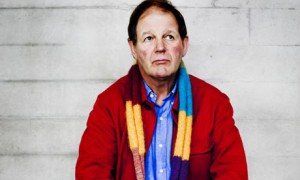 Children’s author Michael Morpurgo published a book called ‘The Kites are Flying’ two years ago, apparently an uplifting story of how children across the divide between Israel and the Palestinians find friendship in the common pursuit of kite-flying across the Separation Barrier.
Children’s author Michael Morpurgo published a book called ‘The Kites are Flying’ two years ago, apparently an uplifting story of how children across the divide between Israel and the Palestinians find friendship in the common pursuit of kite-flying across the Separation Barrier.
It’s an extraordinarily political thing to do to write about an ongoing conflict and present it to children who probably understand little of the origins of that conflict.
Putting that thought aside, a few days ago, Morpurgo appeared on BBC2’s Newsnight where he presented a short documentary film he had made in Israel and Gaza and discovered the the real world either side of the divide.
The film and visit were sponsored by the NGO Save the Children.
The documentary showed Morpurgo to be a humane man, desperate for children in this conflict to give us hope that they can live in peace in the future. It was optimistic and idealistic with a smattering of realism. There were also one or two problems with it which I want to discuss.
The documentary was followed by a discussion chaired by Jeremy Paxman with Morpurgo and Louise Ellman (MP Lab Liverpool Riverside) who is a passionate advocate of Israel in Parliament.
I shall come to that discussion too. But first the short documentary, which is still on BBC iPlayer as I write (it does not appear to be on YouTube yet).
Morpurgo begins by telling us about the book he wrote even though he had never been to Israel or the Palestinian Territories. Strange, I thought, that he could write about a subject of which he had had no personal experience and then sell it to kids. But everyone thinks they understand the conflict because they see it on the news channels and read about it in the papers.
We discover he ‘was sent’ by Save the Children to Israel and Gaza as an ambassador for that organisation.
His expressed aim was to try to find out whether children on both sides see a chance for peace or ‘whether my book was sentimental nonsense’.
We see Morpurgo asking questions at a school in Neve Shalom. This school is the first in Israel that is bilingual and ‘bi-national’ as he puts it.
I am already having problems. ‘Bi-national’? Does he not realise that all these children are Israelis? Let’s accept his shorthand for ‘bi-ethnic’ or ‘bi-cultural’ but surely the point is that it is decidedly not ‘bi-national’.
The kids are bright, eager, they speak English. They are typically Israeli. They are happy and smiling, well-balanced kids as far as we can see. Only those who know Israel would be able to spot who is a Jew and who is an Arab.
He now asks them what they feel about the other community. But this is rather ignorant. These are not Israelis and Palestinians from either side of the Barrier. They are not Israelis and Gazans learning together. They all live in the same country, have the same rights, are free to go where they wish, worship where they will, say what they think, write what they believe.
I sense a false analogy creeping up. Morpurgo’s voice and delivery is full of gravitas, empathy, almost like a Church of England vicar.
He asks a Jewish kid if it is easy to play with ‘Arabic’ kids. The boy says ‘yes, but it takes time’. The boy tells us that the word ‘Arab’ is used as a ‘curse’ – he means it’s a defamatory name to call a friend, like ‘Jew’ is to an Arab, no doubt. Clearly this kid has not been primed by the hasbara police.
Another boy, an Arab (I think!) tells us that on the news we only see the bad things not the good. No-one has asked the Arab children what they think of the Jews. Maybe they don’t speak English as well as the Jews.
Morpurgo and the kids make kites, like in his story. He believes that the more schools like this, the more chance of reconciliation. But again he does not understand. Yes, there are tensions within Israel; yes, the Arabs are discriminated against and their opportunities are fewer. The point he misses is that this school is no different to, say, a school in the USA where black kids are integrated with white.
It’s about making a single society, it’s about achieving the true objectives of Zionism and the ideals of the founders of the State; equality not just in law but in fact. Arabs need to feel more part of the state and less as suspicious aliens in their own country. They need equal opportunity and they need freedom from prejudice and suspicion.
What Morpurgo misses is that the school he thinks this one in Neve Shalom is, would, in reality, be a school where Palestinians from the Territories go to school with Jews from Israel. That’s where the reconciliation is needed far more than in Israel. That’s the true test of children becoming the future peacemakers.
Instead, children in the Territories are taught not reconciliation and understanding but hate and murder, genocide and martyrdom. Why did we not see this in the film? Why did Save the Children not take Morpurgo to a typical school in the West Bank? Why did they not show him he kids TV programmes which deny the existence of Israel and promote the killing of Jews? It’s these children who need saving more than Israeli Arabs, surely.
The kids happily fly their kites with whoops of joy. Children playing together. At the age of 12, we are told, they move on to secondary school and separation.
We are now taken to Sderot, the town in Israel which has been under constant bombardment from Gaza since Israel withdrew from Gaza completely in 2005. It was Sderot which was one of the main reasons for Israel’s attack on Gaza in Operation Cast Lead in 2008-9. Sderot is just a few kilometres from the border.
Now a rarity. Morpurgo explains to us with newsreel footage, that Sderot is under constant threat of attack.
Soon we are are taken to Operation Cast Lead and told that despite this, the attacks continue. Sderot and its problems are soon left behid, This was the ‘balance’ part of the program. Now for the ‘horrors’ of Gaza.
Morpurgo mistakenly tells us that the Gaza strip is surrounded by a great wall. This is not true. Most of it is a fence.
He tells us about the blockade to prevent weapons entering. ‘To me, it looks like a siege’, he says blithely. I wonder how many sieges he has seen.
At this point, of course, Morpurgo does not realise that what he sees and where he goes is strictly controlled by the Hamas propaganda machine and he is falling for it straightway.
Clearly, there is a huge difference between what he sees in Gaza and what he just saw in Israel. He is shown the worst of Gaza but the hotels and pools, the shops full of food and white goods are nowhere to be seen.
Morpurgo is not an investigative journalist, he is a writer. He should also read more. Does he realise, for example, that this ‘siege’ is supported by hundreds of trucks bringing food and other necessities from Israel every day? Does he realise that Israel provides electricity and fuel, treats hundred in its own hospitals free of charge?
I always place a caveat when describing Gaza. Life there is no picnic. They are are in a cage caused by geography and history. Gaza is an enclave cut off from the rest of the Palestinian Territories. It is easy to characterise this as a siege or a ‘prison camp’.
Morpurgo tells us that levels of poverty and malnutrition are appalling. The doctors at the hospital he visits report on these levels of malnutrition. It is a hospital to specifically treat this problem.
Why is this? Does he know that Hamas take foreign aid given freely and sell it in their own shops?
Does he not wonder why Hamas seem to be able to get hold of weapons but are unable to provide food for their people?
If so, he doesn’t tell us.
He does not tell us that if Hamas were not in a state of belligerence with Israel their economy would be as good as that of the West Bank where there is no malnutrition and where attacks on Israel have considerably reduced.
Why does he not question the fact that the shops are full of food, so why do children go hungry?
We are now taken to the Tamar school in Gaza City which looks like any other city in the Middle East. The kids here are not like the Arabs of Neve Shalom. They are ‘angry’, they have seen their family members dead in the street. We do not know, however, what these family members were up to at the time.
No doubt they are traumatised. No doubt they are brain-washed with hatred. Morpurgo is not focused on this. He wants to discover seeds of reconciliation in their hearts. As in Neve Shalom, the Gazan children (who do not look emaciated at all, quite normal and healthy) are making kites.
He asks the children what they think of Israeli children. A young girl says that the blockade is made by the Israelis. They want their children to have rights, but not Palestinian children.
Morpurgo asks if they could talk to Israeli children were they to be there at that moment. The reply is that one day that child might be a government minister and lift the blockade.
So we see that the children of Gaza believe the blockade is some sort of punishment for them and is not prompted by anything perpetrated by Hamas. So why no blockade on the West Bank? The word ‘blockade’ should rightly refer to the maritime blockade. There is no land blockade, but there is an embargo of certain items such as building materials which could be used for terrorists purposes.
The embargo and blockade are not pretty, but can you name any historical situation where a country supplied anything to another country or political entity which threatened it daily and whose purpose was the total destruction of that country?
A young boy says that there are people who want to take what they have by force and they must try as hard as they can to get back their land by blood. Nice. This is the point, of course. Israel left Gaza completely. The boy means Israel when we speaks about getting back his land. This is what he is taught, he knows no other reality.
The same boy tells horrendous stories of how his family members were killed by Israelis during the conflict.
Despite this, Morpurgo says ‘I sense a willingness not to condemn Israeli children’. I do not know where he got this sense from, it is not evident in the film. In any case, children grow up and become martyrs or fighters. The boy in the film may be 12 years old. He may already have been on ‘operations’. Who knows.
More kite-flying and more wishful thinking from Morpurgo. I don’t blame him for his optimism, but he needs to be a student of the conflict to understand the realities and the death cult and antisemitism aimed at children daily. He does not report on this form of child abuse, of course, because Hamas would never allow him to see it.
Morpurgo is clearly moved by his experiences in Gaza. ‘Leaving Gaza, I feel like a deserter, turning my back on all the suffering and despair’.
He is now subjected to a Pallywood moment and falls for it. I may be being cynical here but the Palestinians are past masters at staging atrocities when foreign film crews happen to be passing through.
We are told and see film of young boys collecting rubble near the border which they can sell in Gaza. Morpurgo does not question why young boys of about 12-14 should be near a a known danger at the border.
Then Morpurgo tells us that whilst he is waiting to cross he hears gunshots. A young boy has been shot and has been put on a cart pulled by a donkey to get him to hospital.
How convenient. I do not want to sound insensitive but I really don’t buy this. We see the cart coming straight at the camera with ‘ a young kid lying bleeding in the back of it’. Morpurgo says he has never seen anyone shot before. I think he still hasn’t.
The Israelis use remote controlled guns to shoot at anyone who comes near the fence. Even Morpurgo says it’s difficult for him to ‘confirm this has happened here’. But he said he saw a bleeding boy? Who does he think may have shot the kid? Or is he suggesting that he was not shot at all. If so, why does he not say so.
Morpurgo is upset that a commander has to give an order for these remote guns to be fired, but he still does not question why these young boys are allowed near the fence by the Hamas police or their parents. He does not know that this is sanctioned because it gives cover to those who would lay explosives to kill Israelis. If the Israelis fire they might kill a young kid being used as a human shield. Another martyr and another black mark against Israel.
But Morpurgo just sees them as kids scavenging to make a living. He even says they do it near the border to ‘cock a snook’ at the Israelis. He does not appear to be confused by the fact that no-one has run away from the scene of the ‘shooting’ and life carries on. He does not realise he has been the latest victim of Pallywood.
Morpurgo’s conclusion comes more from his own sense of hope and his love of children. He believes the seeds of hope are there on both sides. He sees this as a morally equal battle. He does not appear to take sides – at least not yet. He accuses no-one, at least not yet.
He believes that peace will come as it did in Europe, South Africa and Ireland.
I don’t like analogies. None of these are analogous to each other or the Israeli-Arab conflict. Let’s hope he is right, but not in my lifetime, I fear.
Back to Paxman in the studio who tells us with that voice of his that expresses cynicism that the IDF told the BBC that remote guns are used to stop terrorist attacks near the fence. Last month young boys tried to place a cart full of explosives at the border. His expression seems to say ‘you would say that wouldn’t you’.
The studio discussion is most interesting mainly for the ineffective performance of Louise Ellman – she really must up her game. She comes over as an apologist who has few answers and expresses those she has as if they were platitudes that no-one will believe.
Morpurgo strongly believes that despite the situation, if Gazan children came to Israel and Israeli children to Gaza a dialogue could start and sow seeds of reconciliation for the future.
Of course, many, many friendships existed and still do between Israelis and Gazans. They do business, they call each other. Many Gazans worked for Israelis and bonds were formed. We don’t hear this.
Ellman tries hard to tell Paxman that Hamas is at the heart of the problem using the children as human shields and gives them explosives or forces them to carry them.
Paxman asks her to comment on the ‘siege’. Like an idiot she uses his word and therefore implies she believes that it is a ‘siege’ when answering his question! She says the siege is about preventing weapons getting into Gaza to be used to blow up Israeli children. She does not distinguish the blockade from the embargo, and so her argument is not convincing.
Paxman, to his credit, says to Morpurgo that he been ‘had’, but only because he didn’t go to Sderot to see what was happening there. Morpurgo insists he does know about it.
But now Morpurgo moves into Guardian anti-Zionist narrative by saying ‘You cannot wage war on children’ and telling us more than 300 children died during Cast Lead. But all wars are fought against children in that they get in the way. And in Gaza, Hamas puts them in harm’s way and some of these children were actually combatants.
Paxman pulls him up on this, again to his credit, and says Israelis are not going in to kill children and Morpurgo says ‘but it happens’. Of course it does. That’s what happens in a war. Should Israel allow its children to be targeted in their schools and do nothing in case Gazan children are killed in their attempt to stop it? Is he serious? It’s Hamas who are targeting children; their own by abusing them to become militarised at a young age and the Israeli children because Hamas send their rockets at times when they know children are going to school or coming home. So who is it that is targeting children? Ellman says nothing.
Morpurgo speaks of a cycle of hatred caused by Israeli actions. There is no cycle of hatred because Israelis do not hate Gazans, they hate Hamas. They are the haters, not the Israelis.
Morpurgo quotes a figure of 26 children shot by Israelis, targeted, he says again, in 2010. But again, what is a child? 16 is not a child in Gaza terms. 14 is not. Why are these ‘children’ at the fence? What are they doing? It is Hamas who use them cynically. If they succeed, Israeli soldiers are killed or maimed, if they fail, Israel is killing children.
How many children died in Iraq in 2010 as a result of terrorism, or in Pakistan? No-one seems to care about these children, only Gazan children who are very often on some military operation.
The discussion comes to an end with Paxman dismissing claims that it’s all one side’s fault or another and that Morpurgo’s idea is a good one but how can you do it with a wall in the way. Ellman tells us that that the wall / barrier is there because Hamas kids go into Israel with suicide belts. Not very convincing.
That’s not why there is a barrier. Morpurgo then smiles and says he hasn’t seen kids with suicide belts and there is a lot of talk about this and implies it’s all rubbish. Ellman here has really lost the plot by banging on about kids with suicide belts. The vast majority are adults and her argument is not helped by a failure to explain the purpose of the barrier.
She redresses the balance by telling us about Gazan children treated in Israeli hospitals, but it’s all delivered in monotone. Israel needs a better advocate than this. Sorry Louise, you are just not forthright enough. If I can say I would have done better, then you know it was not a great performance.
Paxman says that we saw some very malnourished children ‘as a consequence of the Israeli “siege”‘. How does he know that this is the reason for their malnourishment? Gaza actually has an obesity problem, apparently. They are 8th most obese (England 11th) for men and 3rd, yes 3rd for women.
Ellman again fails to make use of statistics and blames Hamas, therefore accepting Paxman’s premise even though we do not know the malnutrition rate, its causes, and how widespread it is. It’s all surmise and speculation, no hard facts. In other words, Hamas’s propaganda machine wins again. How many starving kids did Morpurgo see outside the hospital?
Morpurgo ends by telling us that Neve Shalom is a beacon of hope where both groups can rub along; Paxman clarifies that these kids are Israelis, but Morpurgo persists in his incorrect claim that these are Israeli kids and Arab kids – he is wrong; they are Israeli Jews and Israeli Arabs. He does not appear to understand the difference. When it comes to this conflict, ignorance is not bliss but a dangerous misreading and misinterpretation which viewers who don’t know any better take as the truth.
Ellman not once pulls him up on this. It was a poor performance by her.
Morpurgo’s final word: ‘we are all friends of Israel here, but it does them no good to target children’. Ah, that old blood libel. Morpurgo should know better.
Michael Morpurgo is a very well-meaning man and I truly believe he is neutral and wants peace, although there was a hint of one-stateism in his report and discussion. However, he needs to get his facts right and the Israeli case needs to be better represented on these occasions. Ellman does her best, but I was not impressed.
Update 22.02.2011
In the Dimbleby Lecture which Michael gave on the day after this programme he repeated the story of the boy that was shot near the border fence. Even though he said he could not be sure what happened, he stresses that it does happen regularly.
I concede that it may well be true that the boy, or teenager, was shot and maybe operating in an exclusion zone is meant to provoke such actions. However, can you say in one breath that such young men have been guilty of planting explosive devices intended to kill Israelis on the other side of the fence, and in the next breath condemn the Israelis for trying to prevent it.
As I asked above, why do the Palestinians allow youngsters to operate in such a dangerous zone? In the BBC film we could clearly see Palestinian police watching but not intervening.
Morpurgo has failed to identify the fact that Hamas are completely comfortable with sending children on ‘operations’ and do not have his qualms or share his morality.
 You can’t keep Israel out of any conflict in the Middle East.
You can’t keep Israel out of any conflict in the Middle East. Henri-Lévy argued that hundreds of thousands of people were at risk. His mission was humanitarian. Atwan’s mission, as ever, was political.
Henri-Lévy argued that hundreds of thousands of people were at risk. His mission was humanitarian. Atwan’s mission, as ever, was political.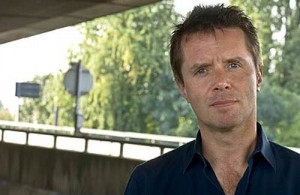 Instead, the fact that Hizbollah and Hamas had been firing rockets and abducting Israeli soldiers and were being armed by Atwan’s beloved Iran and that both Hamas and Hizbollah were implacably committed to the destruction of Israel and the killing of Jews, was turned into an aggression equivalent to a tyrant targetting his own people in an attempt to hold on to power.
Instead, the fact that Hizbollah and Hamas had been firing rockets and abducting Israeli soldiers and were being armed by Atwan’s beloved Iran and that both Hamas and Hizbollah were implacably committed to the destruction of Israel and the killing of Jews, was turned into an aggression equivalent to a tyrant targetting his own people in an attempt to hold on to power.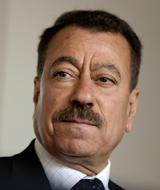 So if I agree with Atwan, maybe there’s something wrong with my analysis!
So if I agree with Atwan, maybe there’s something wrong with my analysis!